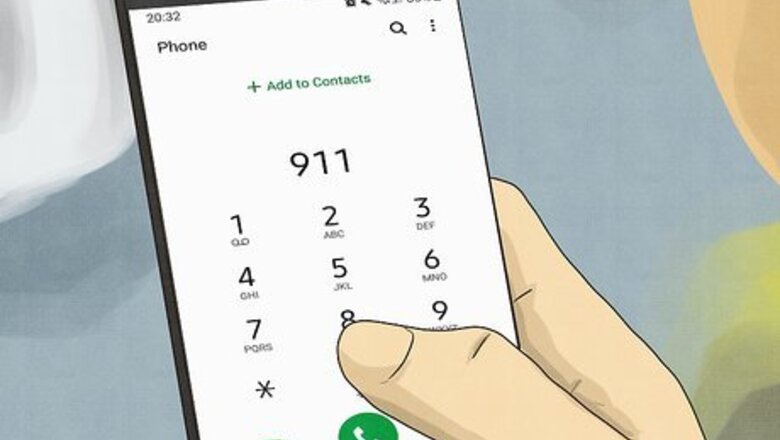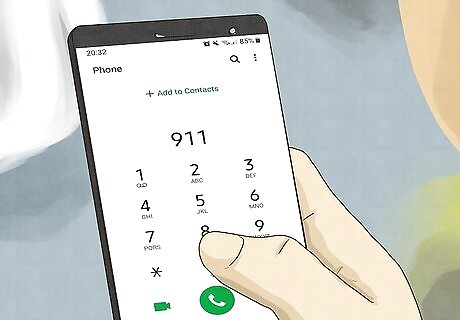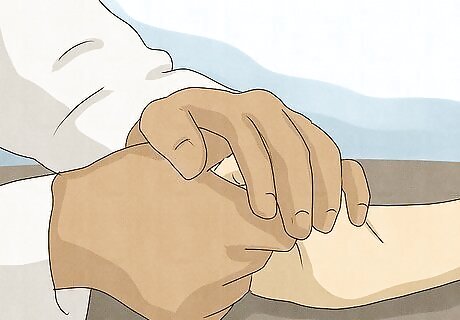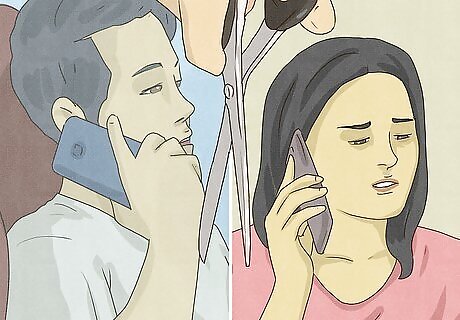
views
Make sure you’re safe.

If you feel threatened, get help right away. Go get someone you trust, head to an LGBT community center, or call the police. Don’t confront someone being transphobic if you’re alone, since you could get hurt. If you are alone when dealing with transphobia, try to head to a crowded area. People are less likely to harass you when there are other people around.
Ask people to respect your name and pronouns.

Start by introducing yourself with your name and preferred pronouns. If people struggle in calling you by your chosen name, gently remind them that you’ve changed it. It can take time for people to adjust to calling you something different. Be patient, but don’t be afraid to correct them. Say, “I’d appreciate it you call me Danny now,” or, “Please change your address book to show my chosen name.”
Explain how certain comments hurt you.

If you feel safe, try explaining why a comment is rude. People may not realize how their comments hurt you or affect you. It can be helpful just to be honest and say what bothers you or makes you feel different or small. For example, you could say, “I know calling me Dana might be hard to get used to, but I need you to make an effort. When you call me by my old name, it makes me feel hurt.” Or, “I’m not sure if you know this, but the joke you just made is pretty hurtful toward transgender people. You probably didn’t mean it that way, but I just thought I’d let you know.”
Shut down invasive questions.

You never have to answer any questions you don’t want to. If someone asks you a personal question that makes you feel uncomfortable, let them know that you won’t be answering them. Tell them it’s not something you discuss casually or talk about with people you don’t know well. Say something like, “That’s private information,” or, “I don’t think it’s appropriate to talk about that right now.” If you see a transgender person getting asked questions like these, feel free to step in and say something like, “I don’t think they want to talk about that with you,” or, “That’s a really weird question to ask someone you don’t know very well.”
Point out backhanded compliments.

Some people may not know that what they’re saying is hurtful. If someone gives you a “compliment” like, “You look just like a real girl!” or, “I would have never guessed that you’re transgender,” point out how harmful the comment is. If you don’t feel safe doing so, you don’t have to, but it can feel empowering to shut someone down like this. Say something like, “You know that’s not a compliment, right?” or, “I’m not sure if you know this, but that’s super hurtful to hear. Just because I’m transgender doesn’t mean I’m not a real girl.” You can also point these out if you aren’t transgender. Say something like, “Hey, I know you meant that as a compliment, but hearing that probably hurt Tiffany's feelings. You shouldn’t say stuff like that.”
Challenge jokes and strange remarks.

People may mask their transphobia in humor. If you feel comfortable, you can use a few comebacks to make that person rethink what they just said. It's not your responsibility to have the confidence to make jokes like this, but if you do, they can be a helpful way to combat insults. For example, if someone questions your gender identity, you might say "So, when did you realize that you were a man/woman/boy/girl?" If someone asks you what's in your pants, you might reply, "My legs."
Forgive people for small mistakes.

Good friends and family members might still mess up sometimes. If they slip up on using a pronoun or make a crude joke, calmly point it out and then move on. If they apologize sincerely and work on not doing it again, you know that they’re a good person to have in your life. Not everything hurtful can (or should) be forgiven. If a friend says something to you that stings, it might take a few apologies for you to forgive them.
Cut contact with intentionally hurtful people.

Not everyone in your life will be supportive, and it’s okay to cut them off. If you have a friend who is being rude or transphobic toward you or others, consider ending the friendship. You can casually stop hanging out with the person as much, or you can let them know the reason why you don't want to hang out anymore. Keep in mind that not everyone will be open to people in your situation. There are always going to be some people who lack empathy and understanding. Treat yourself well and forget about people who don’t treat you well. EXPERT TIP Shahpar Mirza Shahpar Mirza Community Transgender Expert Shahpar Mirza is a Community Transgender Expert who began his transition from female-to-male (FTM) starting in 2016. He has had hormone replacement therapy since 2017 and underwent a double mastectomy (top surgery) in April 2018. Through experiences such as working for the Queer Student Resources Center at Stanford University, he is passionate about spreading more awareness about the transgender community and clarifying common misconceptions people may have. He received his BS in Product Design from Stanford University in 2019. Shahpar Mirza Shahpar Mirza Community Transgender Expert Our Expert Agrees: The best thing you can do is to just ignore someone who's being transphobic. Their goal is to try to get in your head and shake your confidence, so just keep the opposite attitude, which is, "Your opinion doesn't matter to me or affect my life, and I'm going to be confident regardless." However, if it's someone you want to keep in your life, encourage them to educate themselves about the trans experience, and if you're willing, be open and honest with them about your experiences. Reader Poll: We asked 492 wikiHow readers to tell us how they would respond if someone reacted negatively to them coming out, and only 8% agreed they would ask someone close to them to help change their mind. [Take Poll] So, while that may not be a great strategy according to our readers, you may have to cut transphobic people out of your life.
Get support from others.

Lean on your friends and family members for help. It's crucial to have supportive people in your life to whom you can turn when things get tough. Whether it's a formal support group or a monthly dinner with a group of friends, finding these people can be a lifesaver when you need friends that you can trust. Know who will support you and be loving of you no matter what. If you’re having trouble finding a support network, reach out to a local LGBT group near you. There, you can find like-minded people who can help you through the tough times.
Tell someone in charge.

A boss or a principal can help you deal with transphobic people. Transphobic harassment at school or your workplace is illegal in some areas. If you feel comfortable, tell the person in charge about what you’re going through so they can help. It might help if you have records of the harassment, like videos or voice recordings. A principal or boss can also help you escalate the case to the police if you need to.
Get mental health help if you need it.

Transphobia can be tough to deal with, and it can take a toll on you. If you feel like you might harm yourself, get help right away. Talk to someone in your life who you trust, or call a suicide prevention hotline. The Trans Lifeline is staffed by trans people for trans people in crisis. If you live in the US, call (877) 565-8860, or in Canada, call (877) 330-6366.



















Comments
0 comment